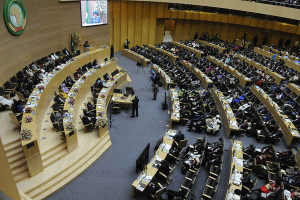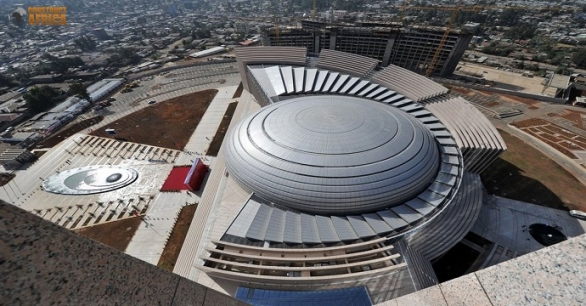By Mohamud Dubet
Cities win the right to be the head-quarters of continental bodies for several reasons. First, they have to be centers where divergent political views and opinions are freely expressed, tolerated without a limit, and are genuinely respected. Secondly, power is not the monopoly and preserve of any coterie. It rests with whoever the citizenry enables to do business on their behalf. For that reason, the people of the countries for which they are national capitals do not fear going to prison indefinitely for expressing their opinions, or even openly defying those in authority since such cities have national mechanisms in place to bring the government to justice in the event it transgresses. Thirdly, the residents of those cities do not worry about violence meted on them by national police or the military in response to their peaceful demonstration to show their dislike for particular policies by their governments because the police and military follow the rule of law. They do not face death and destruction for demanding different or better political, economic and social direction for their countries, or for their particular regions in their countries.
 These cities qualify as national magnets in the first place for being cultural crossroads, economic powerhouses, centers of civilization, and social interaction born out of desire to achieve mutual interests. In addition, cities become continental capitals for being progressive in the realms of science and art, real economic development, creativity in all aspects of life, and tangible contribution to the advancement of humanity as a whole. They serve as the locations of those essential beacons of hope and locus of control that guide diverse masses in a tense neighborhood to the achievement of common objectives and visions. They produce, retain and attract first rate workforce, superb scholars, and excellent policing to deserve the right to host massive continental gatherings of heads of state, local and foreign dignitaries, and representatives of international organizations.
These cities qualify as national magnets in the first place for being cultural crossroads, economic powerhouses, centers of civilization, and social interaction born out of desire to achieve mutual interests. In addition, cities become continental capitals for being progressive in the realms of science and art, real economic development, creativity in all aspects of life, and tangible contribution to the advancement of humanity as a whole. They serve as the locations of those essential beacons of hope and locus of control that guide diverse masses in a tense neighborhood to the achievement of common objectives and visions. They produce, retain and attract first rate workforce, superb scholars, and excellent policing to deserve the right to host massive continental gatherings of heads of state, local and foreign dignitaries, and representatives of international organizations.
The Ethiopian Capital and African Union Head-quarters, Addis Ababa, does not meet any of the above conditions to be Africa’s continental capital. In fact, it is famous for being the opposite of all that entitle a city to be the seat of an organization that aspires to integrate, develop, and unite a continent as diverse, remote and disconnected as Africa. To understand the reasons why Addis Ababa can not be Africa’s base of operations, one needs to understand the true state of Ethiopia as a country. Not only is it a virtual dictatorship that represses the progressive desires of its own citizens, but it is a regional trouble-maker that continuously foments conflict in its immediate neighborhood as well.
Despite international media ballyhoo of Ethiopian political and economic rise, politics in Ethiopia has been the monopoly of the ruling EPRDF party since the fall of the military regime in the 1990s and the feudal empire state which preceded it. No any other party can venture into it without suffering its wrath. As a result, there has not been any political opposition to speak of in present day Ethiopia since its creation by European powers in the 18th century. Opposition leaders, academics, writers, journalists, and progressive figures have either died in jail or fled to seek asylum abroad for fear of their personal safety. Furthermore, Ethiopia’s economy has been in the hands of the ruling Tigrey People’s Liberation Front (TPLF) minority elite and its client regional governors for the last twenty-five years in spite of Western media exaggeration that portrays Ethiopia as an economic success. Moreover, Ethiopia has had unresolved conflict over disputed territory with both Eritrea and Somalia, its neighbors to the North West and Southeast twice in the past, with a heavy human loss, and is still technically at war with both. The potential for future regional conflict does not only exist but is a given owing to the absence of the rule of law in Ethiopia and its free reach in its vicinity. This has rendered the Horn of Africa one of the most heavily militarized parts of the world where numerous wars and tensions erupt by the day.
As such, Ethiopia is not known for progressive governance that other African countries can copy and apply to their national needs. Apart from long distance running mainly by the resilient Amhara tribe athletes that hail from the country’s rift valley region, Ethiopia is thus far bereft of desirable talent, original ideas, scientific breakthroughs, and cultural revolutions that can better the lives of its own people let alone spill over to other African countries. Further, its minority leadership, is averse to modernizing its economy as every sector of business is over-regulated, controlled and directed in a Communist style bureaucracy that does not allow proper foreign direct investment to trickle down to its hungry masses while grabbing strategic pristine land from the poorest of its poor to lease to international corporations for a pittance to finance repression.

Historically, it is the only African country that was not colonized save for a brief Italian occupation. Why? Because it was invited to and actually took part in the Berlin conference in the 1800s in which European colonial powers planned to divide and colonize Africa. In that way, it has been a traitor to the rest of Africa, a fact which African leaders have either been blind to, or have foolishly ignored, much to the happiness of colonial powers and chagrin of progressive African intellectuals.
How, then, does lawless Ethiopia serve as the head-quarters of the African Union, an organization that claims to develop and integrate the Africa continent? The answer is the current crop of African political and business leaders are irrational men and women most of whom are stuck in the distant past and who are so afraid of and averse to change in the status quo that was put in place by their less enlightened predecessors in the 1960s. They do not not keep abreast with the times, do not have the leadership skills to affect modern global economic trends in their countries, and are certainly not interested in bringing about real change to the continent. By basing a “progressive Organization” like the African Union in Addis Ababa, Ethiopia, a city in which the persecution and oppression of Africa’s second largest population has been devised and executed with precision by a minority elite for well over a quarter of a century, African leaders have put out the last glowing amber of hope that would have brought our remote and under-developed continent together.
For that reason, African leaders should re-examine their leadership knowledge of the benchmarks against which cities and countries are measured to qualify for being political, scientific, and economic policy hubs. Lest they forgot, their lack of strict adherence to the rule of law; dearth of promotion and preservation of human rights in their governments; scarcity of generous tolerance of political views and freedom of expression in their countries; inability to spot and encourage talent in every field throughout the continent; incapacity to create knowledge based economy through making scientific research and development as some of the greatest pillars of the African Union; and their dislike for adoption of high quality governance as well as their rudimentary ability to affect progressive change across national borders are what makes thousands of African youth, doctors, teachers, and engineers brave the high seas each year to reach Europe, North America, and Australia where the talent of those who do not perish in the ocean is put to maximum use.
As a result, much of the above acute deficiencies and weaknesses that have afflicted the African continent since the end of European colonialism emanate from the African Union’s choice of Addis Ababa as its headquarters. Addis Ababa does not even meet the bare minimum conditions to inspire continental tilt towards progressive direction much less be its political and economic center. It should henceforth cease to be the head-quarters of the African Union, if the continental body is to chart a better and more hopeful future for Africa’s youth who make over 70 per cent of the total continental population. There are more suitable and better positioned cities in African to be the African Union head-quarters than Addis Ababa. These cities readily qualify for the continental capital title for housing national governments: that do not oppress their citizens, that promote economic equality, that do not concentrate economic well-being in the hands of the ruling minority elite, that strictly adhere to the rule of law, and that do not repress independent thinking, freedom of speech and thought, and peaceful political opposition.
Mohamud Dubet
Email:ugasnadif@gmail.com
——–
The writer is a member of the African Diaspora Community.


Leave a Reply